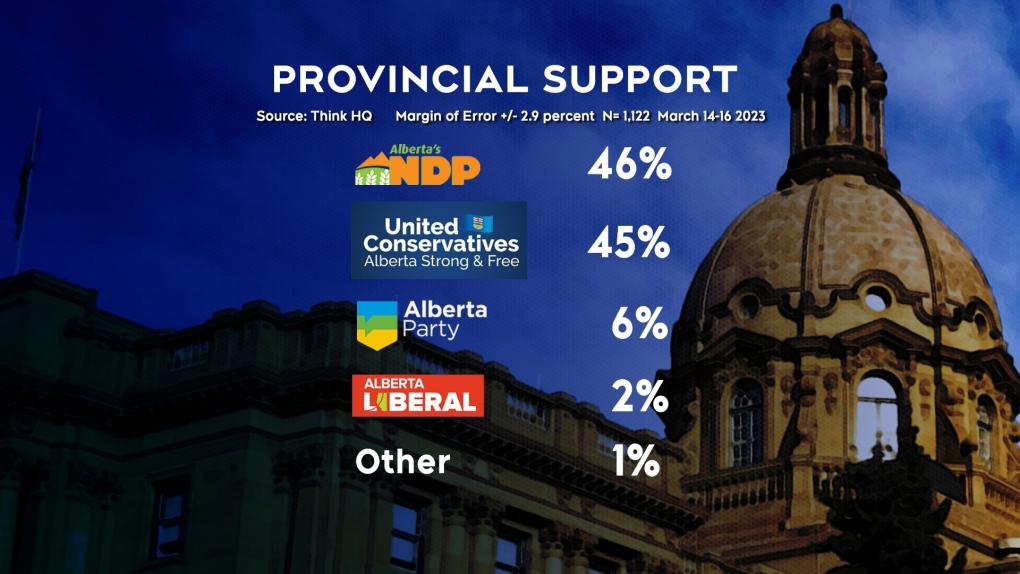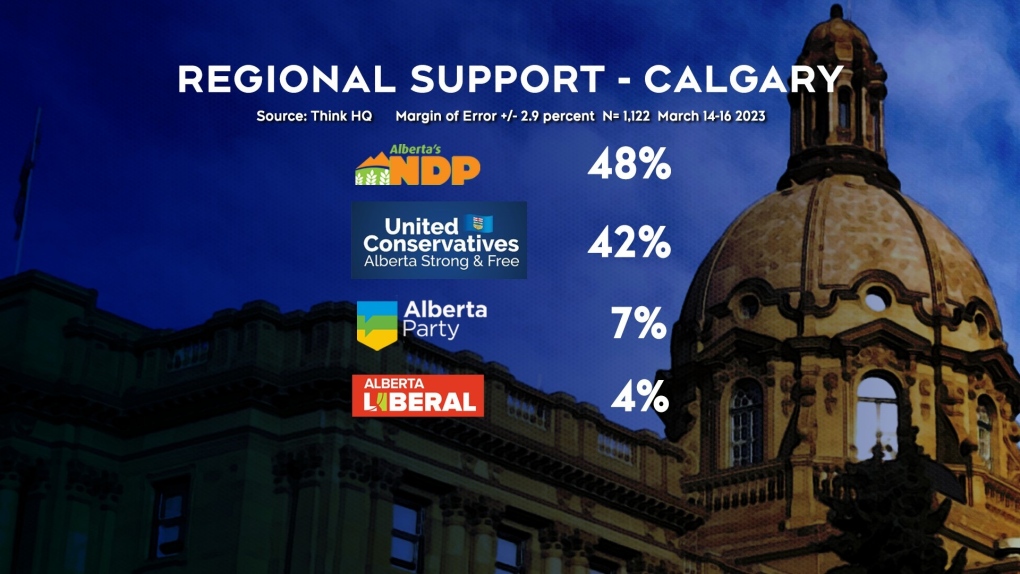Battle between UCP, NDP too close to call as provincial election inches closer: ThinkHQ
A new political poll surveying Albertans ahead of May's provincial election shows a deep divide within the province, with the governing United Conservative Party and Alberta's New Democrats fighting neck and neck for support.
ThinkHQ says if a provincial election were held tomorrow, the NDP hold a marginal edge with 46 per cent of the decided vote, statistically tied with the governing UCP with 45 per cent.
The firm says the Alberta Party remains well out of contention with only six per cent, followed by the Liberals at two per cent.
ThinkHQ Marc Henry says the governing UCP should have an easier path to re-election, with large support across rural Alberta.
"The results of this survey are a bit surprising, almost counter-intuitive," Henry said.
"The Smith government has released a 'chicken-in-every-pot' budget, are spending a lot on advertising the budget and their 'inflation-fighting' measures. Yet, they aren't seeing a return on that investment in the polls; in fact, they're down three points from January. Margin of error, but still."

ThinkHQ surveyed 1,122 people online between March 14 and 16.
Political experts say Calgary will be a battleground in the next election, deciding the outcome of the election.
ThinkHQ found the NDP lead in the city of Calgary among decided voters at 48 per cent, compared to 42 per cent for the UCP.
"If they can get that lead up to eight to 10 points, they'll win this," Henry said.
"The NDP basically need to get around 18 to 20 seats out of Calgary in order to win. The UCP need to hang on to six, seven or eight seats for them to win and not have to worry about other seats in other parts of the province."

However, the parties are evenly matched throughout the Calgary Metropolitan area, polling at 45 per cent each.
Premier Danielle Smith declined an interview with CTV outside her appearance in Cochrane at the Alberta Mid Sized Cities Mayors Caucus.
Her office says the party has come a long way in the polls since the fall.
"In the fall, the UCP was around 20 points down in the polls and now, less than six months later, we are tied with the NDP," press secretary Rebecca Polak said.
"This is a clear indication that Albertans have seen a positive change and have noted that our government is laser-focused on growing the economy, creating new opportunities, improving our health-care system and putting in the work to ensure that all Albertans can feel secure in their communities."
Joe Ceci, municipal affairs critic with Alberta’s NDP, says the ground made up in Calgary by the party speaks to what Calgarians are seeking in government come the next election.
"They can either vote for the UCP that is kind of doing things that people don't want, or they can focus on fixing health care, fixing education, making sure that we revitalize downtown Calgary," Ceci said.
In Edmonton, ThinkHQ says, voters are most likely to vote NDP, securing 64 per cent of the vote, compared with the UCP’s 24 per cent.
In small urban areas and rural communities, the UCP is expected to receive around more than 55 per cent of the vote.
One political scientist from the University of Lethbridge says there may be some divide from the staunch conservatives not supportive of a big budget recently passed by the UCP government.
"To some extent, the budget almost looks like it was an NDP budget," Trevor Harrison said.
"So, that goes against the grain of some people who have supported the party."
The poll found women or those under the age of 35 are more inclined to vote for Rachel Notley.
The majority of men and those over the age of 35 are more inclined to vote blue.
The poll has a margin of error of +/- 2.9 percentage points, 19 times out of 20.
Alberta's provincial election is set for May 29.
CTVNews.ca Top Stories

BREAKING Scotiabank suffers direct deposit outage on pay day
Scotiabank has acknowledged technical difficulties affecting direct deposits as clients report missed payments Friday morning. On Friday morning, the bank's client services phone line was playing an automated message assuring customers that work was underway to rectify the outage.
BREAKING Canada Soccer head investigating 'systemic ethical shortcoming' amid spying scandal
Canada Soccer chief executive officer Kevin Blue said he was investigating a potential 'systemic ethical shortcoming' within the program but has not considered pulling the women's soccer team from the Paris Olympics due to a drone spying scandal.
Paris Olympics begin with unique opening ceremony along the Seine
The Paris Summer Olympics officially get underway today with a unique opening ceremony. Instead of marching into a stadium, representatives from more than 200 competing countries will enter the Games on boats along the River Seine.
Elon Musk's estranged daughter calls out his 'entirely fake' claims about her childhood
Vivian Jenna Wilson, Elon Musk's estranged daughter, publicly refuted several recent anti-trans statements her Tesla CEO and X owner father has made about her.
'She led it the whole way': 18-year-old B.C. woman leads hikers to safety in Jasper National Park
As fire threatened people in Jasper National Park, Colleen Knull sprung into action.
'Catastrophic' situation 'cannot continue': Open letter from Trudeau, other PMs calling for Gaza ceasefire
Prime ministers of Canada, New Zealand and Australia released a letter renewing calls for an “urgent ceasefire” in Gaza on Friday morning.
Arson attacks cause travel chaos before start of Olympics in Paris, thwarting athletes' travel
Arsonists attacked the French high-speed rail network early Friday, paralyzing travel to Paris from across the rest of France and Europe for some 800,000 people, including Olympic athletes heading to the grand opening ceremony of the Games in the evening.
Latest updates on wildfires in Jasper National Park: Rain, cooler weather limiting spread
Cool and wet weather is making a difference in Jasper National Park.
'He was just gone': Police ramp up search for vulnerable 3-year-old boy in Mississauga, Ont.
Police in Mississauga are conducting a full-scale search of the city’s biggest park for a non-verbal toddler who went missing Thursday evening. Sgt. Jennifer Trimble told reporters Friday morning that there has been no trace of three-year-old Zaid Abdullah since 6:20 p.m., when he was last seen with his parents in Erindale Park, near Dundas Street West and Mississauga Road.































